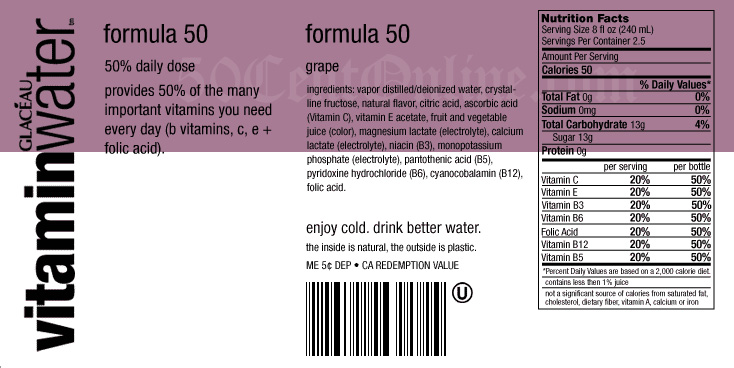When I shopped in the super market this weekend, I found out that many snacks were marked as “healthy” or “natural.” I felt happy to buy these products because I can fulfill my needs of taste buds, meanwhile do not gain weight. But a video changed my mind.The Video I Wached. It said ” while some brand names on the supermarket shelf may sound healthy, they could be far from it. ” Then I became curious of the beverage in my hands –Vitaminwater.When I saw the nutrition facts, I was so disappointed. 
( The advertisement “the drinks promote a healthy state of physical and mental being, and provide the drinker with antioxidants and other nutrients that reduce age-related eye disease.”)
It shows clearly that Serving Per Container: 2.5, Calories 50g, Sugar 13g. So one bottle of Vitaminwater has 125g calories and 32.5g sugar in total. I was shocked because it has the same amount of caloris as a half slice of cheese pizza! Why is it called “water” when it actually contains so much calories and sugar? The “vitamin” aspect of Vitaminwater confused me in thinking that it was a healthy and all natural beverage.
Coca Cola company takes the advantage of customers’ trust and is irresponsible for customers’ health. What it really care is the money in people’s pocket. People are too lazy to read the nutrition facts. They tend to be undue faith in the words in advertisement. Also the colorful packaging of the beverage attract all the attention from customers. So customers’ ignorance and carelessness make the company barefacedly abuse their trust. Coca Cola should be aware that customers can bring it up, also push it down. So I suggest the company modify the advertisements and help customers make the right purchase choice.

Hi Xin,
I agree with the fact of that this is an instance of unethical marketing. Especially when the listings are given for less than half the entire bottle. However, it is important to keep in mind when comparing this drink with other drinks by Coca Cola, Vitamin water indeed provides as a better health product. The calories present are much lower than that of coke and at the same time, this drink provides many different essential Vitamins. I think that is important to provide full information about the nutrition information. But it is not uncommon to see products that gives the nutrition listing for “1” serving when there are more than “1” serving present in the given container or bottle.
Hi Xin, I just read this post and found it’s pretty funny. Yes, many companies are really trying to slight over what’s wrong with their product. For the case you mentioned, this Vitamin water is indifferent from coke for people on diet. However, they used the title “water” and making people think that it’s only a bottle of water which contains vitamins complex. I was surprised to know this. I think it’s the governments’ responsibility to make more strict legislation. For example, most bylaws on food safety in Europe is more strict than North America. It’s hard for the “invisible hand” (in economics) to work due to the asymmetric information. This asymmetric information may not necessarily be caused by hidden information from the company, but also the lack of professional knowledge of customers ( which is the case in this post: customers don’t want to read nutrition facts.) A possible way for government to do is to require all food companies write down the significant weakness of their products in the obvious place. It’s hard to implement, but it has applied to some products such as cigarettes.
Very insightful information provided in this article. It certainly feels that many corporations nowadays mislead their customers into purchasing products based on “so-claimed merits” that are in truth not supported by any nutritional facts. To the same end, many customers are also not aware that these “energy and vitamin” drinks are often more detrimental than nutritional. This information is certainly useful for helping consumers in the future about their purchasing decisions!